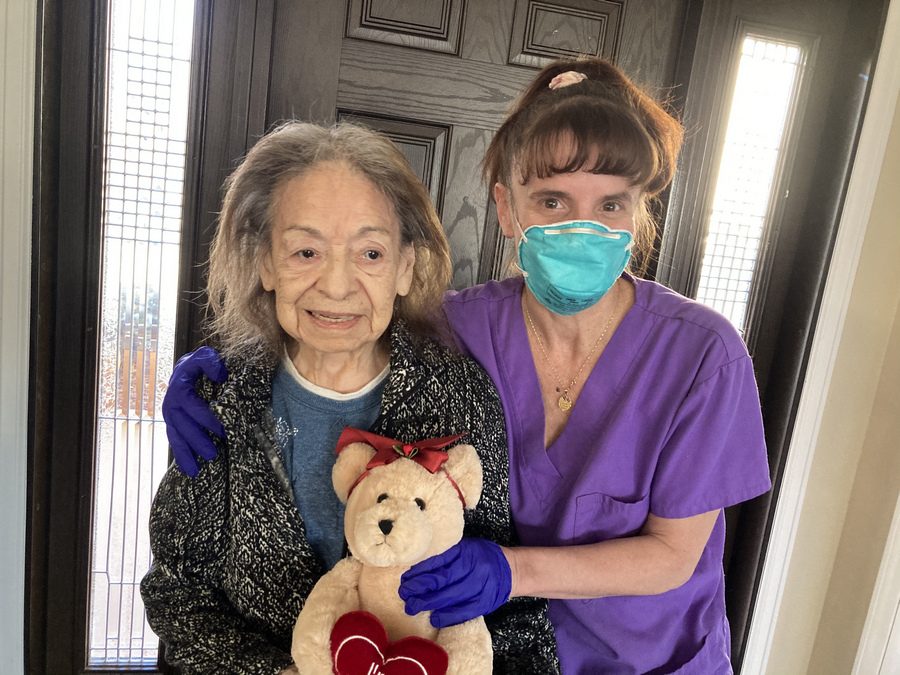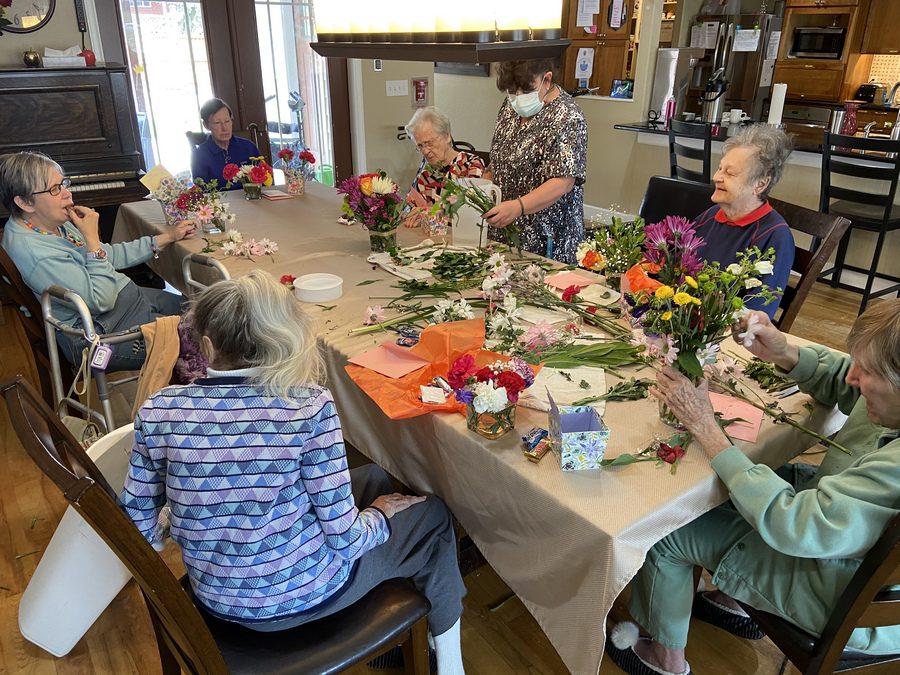Moving seniors to assisted living is a delicate subject. Many seniors are reluctant to move into assisted living facilities, but the transition can be positive.
A recent study found that 87% of those who moved to an assisted living facility from their own homes said they were delighted with their new home.
Families need to plan to make this transition as easy as possible for both seniors and family members.
Here are a few questions that families might ask themselves:
- What is our goal?
- What do we want life to look like when it comes time for us or our loved ones to move into assisted living?
- What are some things we need help with around the house now?
- How long does my loved one need assistance before moving in?
- How much will it cost?
- How do I find the right assisted living?
These questions will help you create a care plan tailored specifically for your needs.
An assisted living home is a safe place that provides all of the necessities for seniors who can no longer live independently. Families often look to an assisted living home or facility when they can no longer care for an elderly loved one.
It’s not easy for families to think about moving a loved one into an assisted living community. Yet, more than half of people over age 65 need some long-term care before they die. For many families, this means planning for this type of care should take place long before their loved ones have memory issues.

Moving Seniors to Assisted Living
Although there can be a bit of a negative stigma around senior living facilities, it is of utmost importance that our seniors are getting the care they need. When a family cares for their elderly loved one showing signs of Alzheimer’s, dementia, Parkinson’s, or any other memory care ailment, they are not trained to care for them.
Transitioning from caring for your loved one to moving them into assisted living can be more difficult for the families than their loved ones.
Here are some tips for moving seniors into assisted living facilities.
- Meet Them Where They Are – It can be challenging to live with or even visit someone with memory issues. Seniors with Alzheimer’s can have delusions or an altered reality frequently.
It is essential to allow your loved one to experience his or her reality. While trying to get them to accept reality can trigger outbursts of anger, confusion, and sadness. Instead of putting our seniors with Alzheimer’s in that position, it is better for them when we play along with their alternate reality.
When your relative thinks they are back in their childhood home or that their spouse is still alive, it is best to agree. Imagine if your relatives were getting annoyed that you thought your spouse was alive, and they keep telling you they’ve passed away. That would be so difficult to comprehend! Remember, many times, our seniors with memory issues are not fully aware of their own senesce.
- Redirection Techniques – Sometimes, seniors with Alzheimer’s, Parkinson’s, dementia, or other cognitive ailments can become fixated on a specific emotion or situation, causing distress.
In times like these, distracting your loved ones can help ease their distress. If a senior with memory care issues is adamant about something, one of the best ways to deescalate the situation is to redirect their attention to something they love.
Maybe while you are helping your relative pack for the move, he or she gets upset that you are “sending them away,” which is quite understandable! You can redirect their attention to a family heirloom and who your relative might like to pass it on to, or begin asking them to tell you stories about their life.
- Let Us Handle the Care – Let us care for them so you can be their family member again. Chances are, your family has been caring for your relative during their cognitive decline. Although it can seem heartless to send your mom or dad to a senior living facility, the staff of your chosen assisted living facility are trained to care for the needs of memory care patients.
Instead of doing chores for your relative, you can visit with them while staff cares for those needs. Moving seniors to assisted living can give seniors more independence than when they were cared for by their families.
In assisted living care, seniors mingle with other residents and create relationships with their caregivers, which might not have been possible before.
Here are More Tips to Help You with Your Move
- Choose the Right Assisted Living Home – Have peace of mind by moving seniors into a quality assisted living facility that is best suited to their individual needs. Evaluate assisted living facilities in the area for a variety of factors, such as proximity to family members and access to transportation options.
- Write a Clear Will – You can help others make decisions about your care needs in the future. It might be too late for your loved one to decide now, but your experience can help you make decisions about what you want later for your care.
Make a will that clearly states what kind of care you want for yourself, and share it with loved ones. If your needs change unexpectedly, they’ll know where to find the document or how to reach out to an attorney for help making decisions on your behalf.
- Access to Amenities – Make sure your loved one has access to amenities that every senior needs to move in their new home. Things like transportation, proximity to emergency medical care, and the ability to live as independently as possible, while still having 24/7 assistance are all important.
Talk with your loved one about what they value most, then find a community that offers those things. Also, make sure they have access to their favorite foods, and at least some activities they enjoy.
- Communicate with Your Loved One About what You’re Doing – Talking openly about the move will help ease any anxiety or uncertainty that may be present. They’ll also know exactly where to find certain items in their new place, such as clothing, photos, and other items that are precious.
- Stay Connected – Stay connected by utilizing family visits, phone calls, and video chats. Sometimes a person’s memory can worsen when they’re in unfamiliar surroundings, and this may be the way to help your loved one relax and help with their memory.
- Speak with Family Members – Before moving your loved one to assisted living, speak to family members to help make a decision. Decide who will be visiting the most, and talk about how often he or she will come. Discuss how you will pay for the care and other important issues.
- Take Care of You – Don’t forget to take care of yourself, too! Having a family member in assisted living care can be stressful for you and other family member. Be sure to take care of yourself and your other responsibilities, such as caring for children or working. This will probably be a long journey and you need your strength and health.

Although it can be difficult for both the family and the senior moving into assisted living, in the long run, it is more beneficial for all those involved to get the help they need. Know that it takes time to adjust to assisted living, but it will get easier.
It can be difficult for families to make the decision of whether or not their elderly loved one should move into an assisted living home. The family will have a lot of questions and concerns, but we want you to know that there are many benefits as well. Please always share you hurdles with the team.
Our team at Applewood Our House Assisted Living Memory Care is dedicated to ensuring every resident has personalized care and support. We understand how important it is for each person’s needs to be met, which is why we offer so much more.
If you would like help learning about what life might look like after your loved one moves from home into assisted living, call us today (303) 956-9037! And/Or, check out Helpful Hints for Moving into Applewood Our House.


